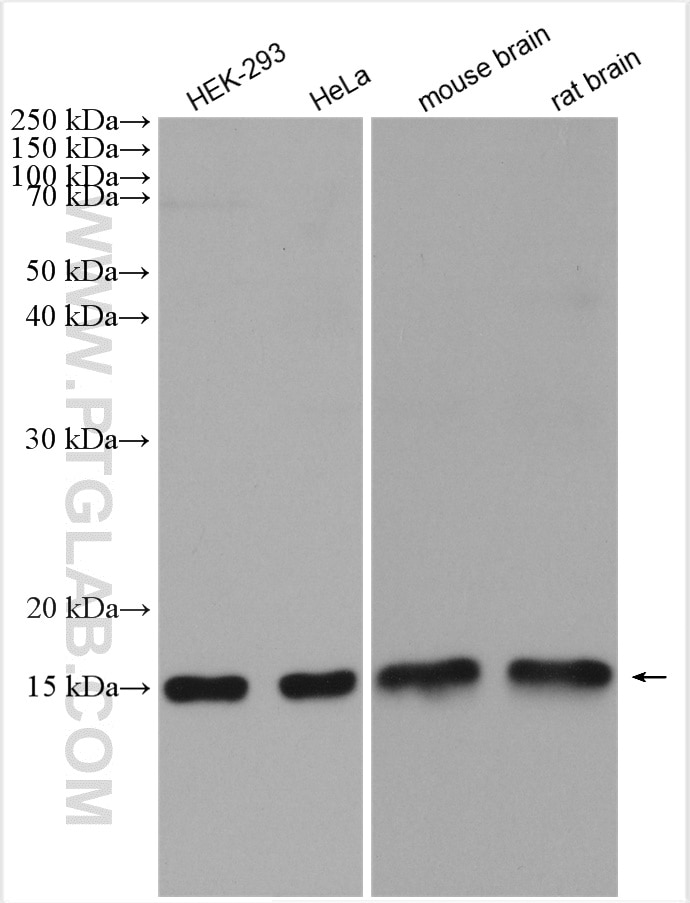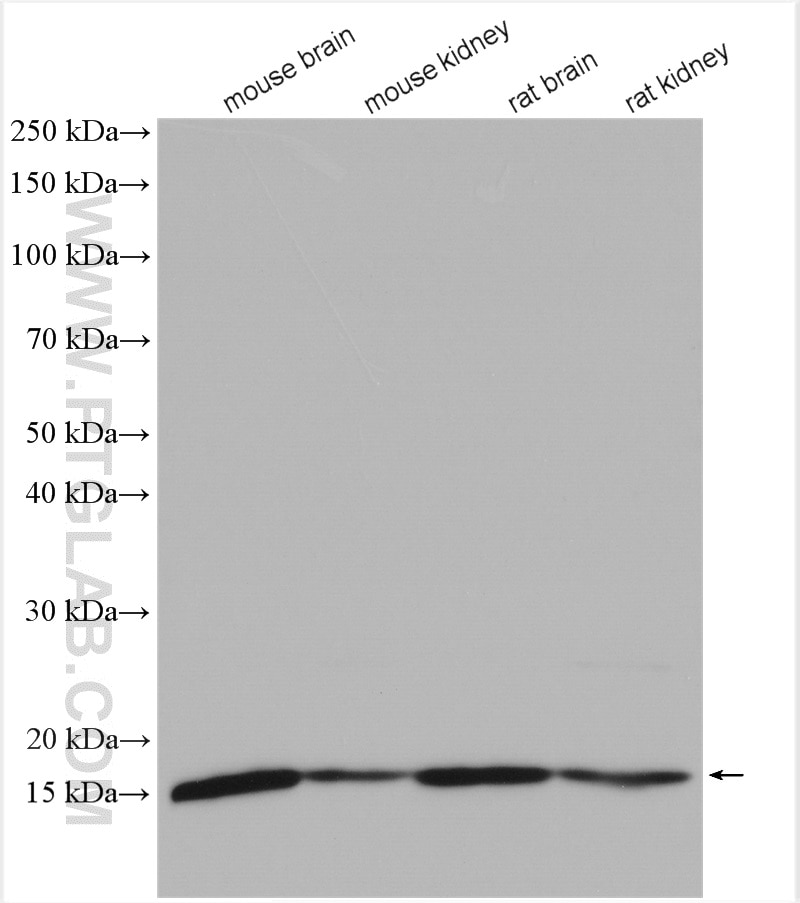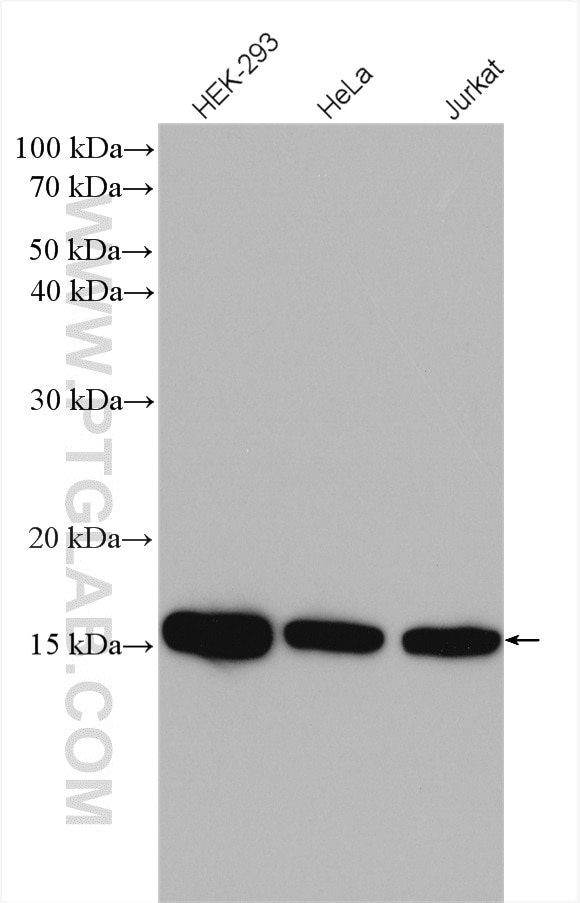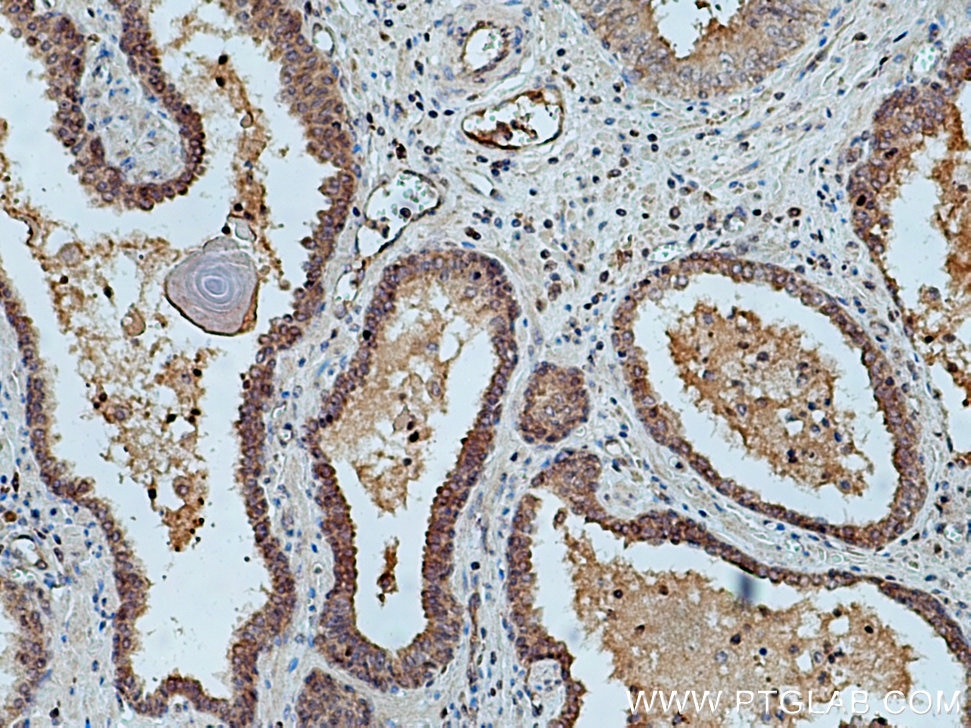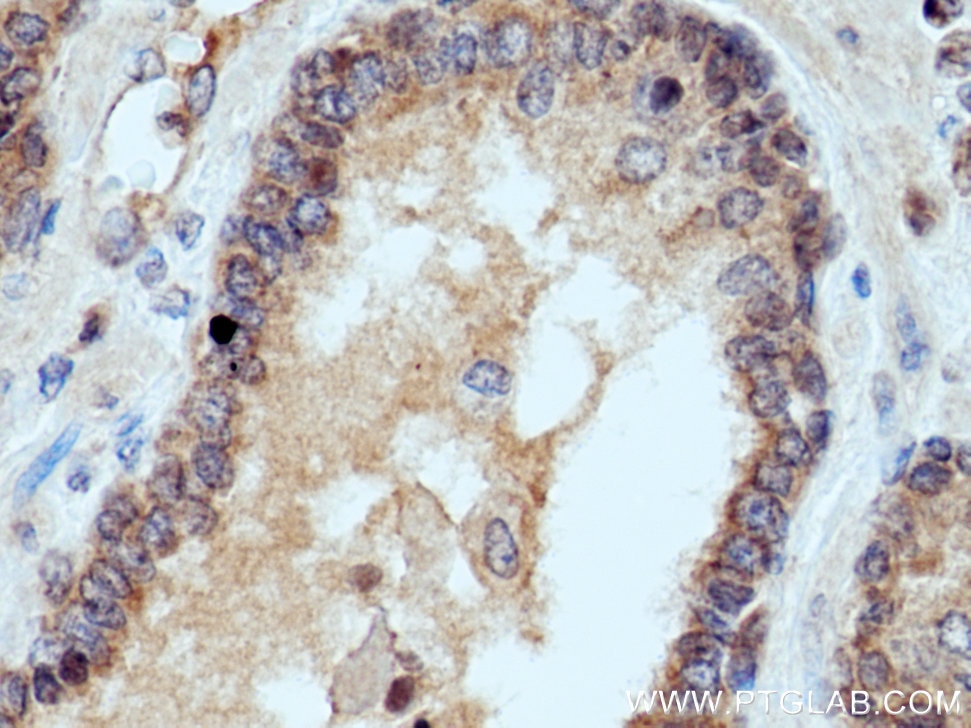Anticorps Polyclonal de lapin anti-UBE2D1/2/3/4
UBE2D1/2/3/4 Polyclonal Antibody for WB, IHC, ELISA
Hôte / Isotype
Lapin / IgG
Réactivité testée
Humain, rat, souris et plus (1)
Applications
WB, IHC, ELISA
Conjugaison
Non conjugué
N° de cat : 11677-1-AP
Synonymes
Galerie de données de validation
Applications testées
| Résultats positifs en WB | cellules HEK-293, cellules HeLa, cellules Jurkat, tissu cérébral de rat, tissu cérébral de souris, tissu rénal de rat, tissu rénal de souris |
| Résultats positifs en IHC | tissu de cancer de la prostate humain il est suggéré de démasquer l'antigène avec un tampon de TE buffer pH 9.0; (*) À défaut, 'le démasquage de l'antigène peut être 'effectué avec un tampon citrate pH 6,0. |
Dilution recommandée
| Application | Dilution |
|---|---|
| Western Blot (WB) | WB : 1:1000-1:4000 |
| Immunohistochimie (IHC) | IHC : 1:500-1:3000 |
| It is recommended that this reagent should be titrated in each testing system to obtain optimal results. | |
| Sample-dependent, check data in validation data gallery | |
Applications publiées
| KD/KO | See 1 publications below |
| WB | See 7 publications below |
| IHC | See 2 publications below |
Informations sur le produit
11677-1-AP cible UBE2D1/2/3/4 dans les applications de WB, IHC, ELISA et montre une réactivité avec des échantillons Humain, rat, souris
| Réactivité | Humain, rat, souris |
| Réactivité citée | Humain, souris, Hamster |
| Hôte / Isotype | Lapin / IgG |
| Clonalité | Polyclonal |
| Type | Anticorps |
| Immunogène | UBE2D1/2/3/4 Protéine recombinante Ag2278 |
| Nom complet | ubiquitin-conjugating enzyme E2D 3 (UBC4/5 homolog, yeast) |
| Masse moléculaire calculée | 17 kDa |
| Poids moléculaire observé | 17 kDa |
| Numéro d’acquisition GenBank | BC003395 |
| Symbole du gène | UBE2D3 |
| Identification du gène (NCBI) | 7323 |
| Conjugaison | Non conjugué |
| Forme | Liquide |
| Méthode de purification | Purification par affinité contre l'antigène |
| Tampon de stockage | PBS avec azoture de sodium à 0,02 % et glycérol à 50 % pH 7,3 |
| Conditions de stockage | Stocker à -20°C. Stable pendant un an après l'expédition. L'aliquotage n'est pas nécessaire pour le stockage à -20oC Les 20ul contiennent 0,1% de BSA. |
Informations générales
Ubiquitination is a post-translational modification pathway or is part of the specific protein-degradation pathway by the 26S proteasome. Ubiquitination of a target protein involves multistep enzymatic reaction catalyzed by a cascade of enzymes including Ub-activating enzymes (E1s), Ub-conjugating enzymes (E2s) and Ub ligases (E3s) (PMID: 23542885). UBE2D family, which has 4 members named as UBE2D1/2/3/4, is an E2 ubiquitin-conjugating enzyme family in the ubiquitin-proteasome system. This antibody can recognize all the four members of UBE2D due to the high homology.
Protocole
| Product Specific Protocols | |
|---|---|
| WB protocol for UBE2D1/2/3/4 antibody 11677-1-AP | Download protocol |
| IHC protocol for UBE2D1/2/3/4 antibody 11677-1-AP | Download protocol |
| Standard Protocols | |
|---|---|
| Click here to view our Standard Protocols |
Publications
| Species | Application | Title |
|---|---|---|
Sci Signal Proteome-wide mapping of the Drosophila acetylome demonstrates a high degree of conservation of lysine acetylation. | ||
Oncotarget UBE2D3 gene overexpression increases radiosensitivity of EC109 esophageal cancer cells in vitro and in vivo. | ||
Am J Cancer Res The E3 ubiquitin ligase RBCK1 promotes the invasion and metastasis of hepatocellular carcinoma by destroying the PPARγ/PGC1α complex. | ||
Front Oncol UBE2D3 Activates SHP-2 Ubiquitination to Promote Glycolysis and Proliferation of Glioma via Regulating STAT3 Signaling Pathway. | ||
Oncol Lett UBE2D3 is a positive prognostic factor and is negatively correlated with hTERT expression in esophageal cancer. | ||
